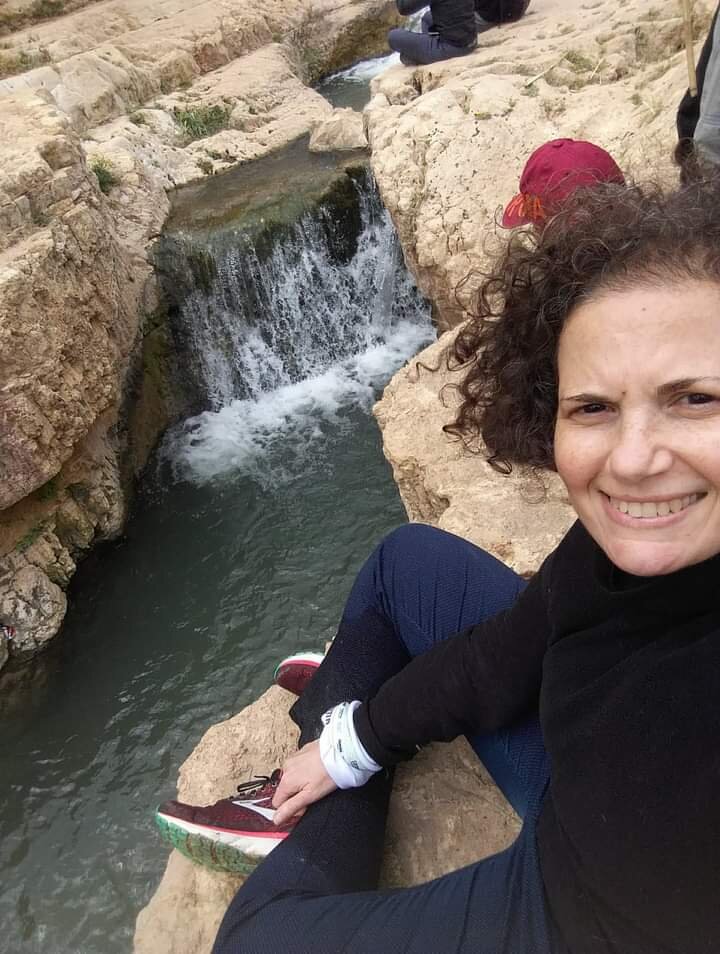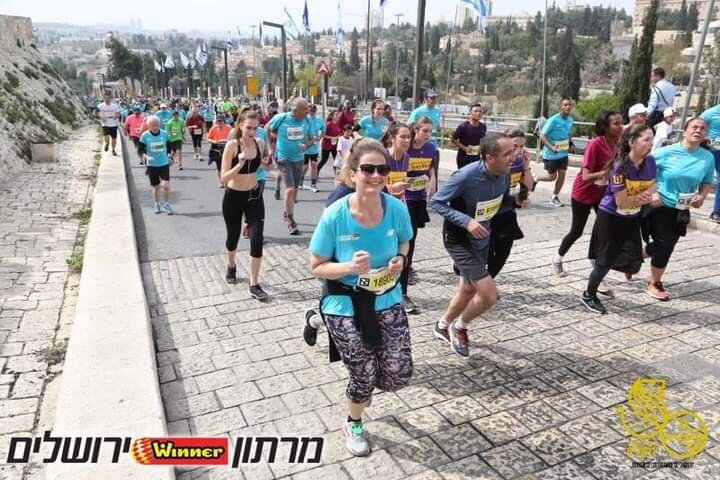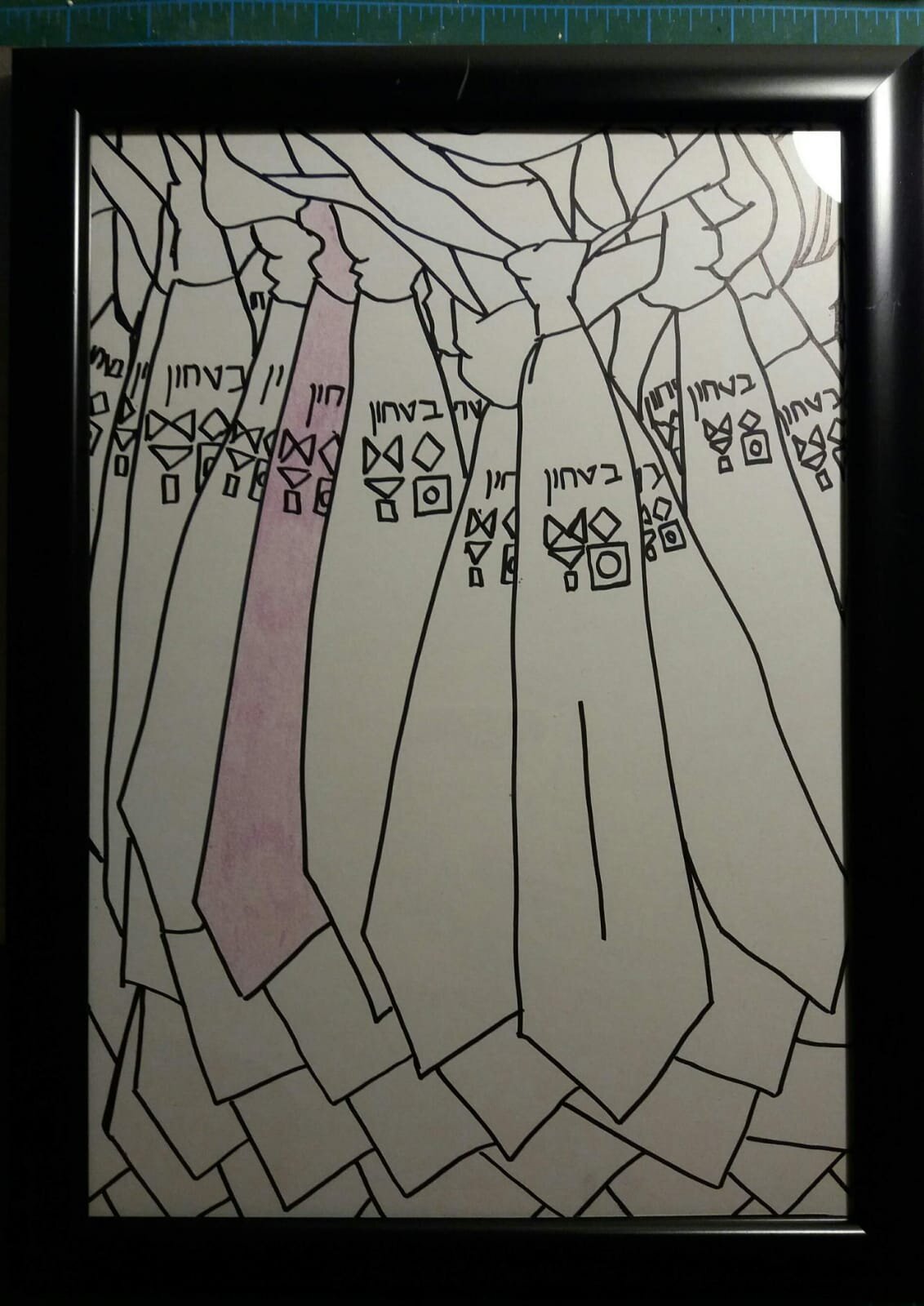HER STORY #78 -vered
Image: “Trip to Wadi Kelt”
Eilat
I was born and grew up in Eilat.
Back then, it was a development town with state budgets going towards the improvement of the education systems and the neighborhoods [in Eilat]. Eilat wasn’t perceived as being a “normal” city but rather a development city.
I grew up in a mixed neighborhood with a lot of struggling and poor people. It wasn’t the best place.
I don’t have anything else to compare it to, but that’s how it was. And for me it was obvious that I would leave one day.
The Only Thing I Knew Was That I Wanted To Draw
After my military service, I really wanted to move away, so I had to save up, and think about what I wanted to do. The only thing I knew was that I wanted to draw, so I started to take a painting course.
It was the light in my life back then, because when I finished my army service, all my friends had moved away from Eilat.
My plan was to move to Tel Aviv and to go to an art school there, and it took me three years until I did that move, and I got to Tel Aviv at the age of 23, and Tel Aviv seemed very polluted, ugly, and just not nice, but I got used to it, and it was a very fun first year at the art school.
Beginning / Think
When a year had passed, I went to study in Bezalel [Academy of Design and Art] in Jerusalem. There it felt like the beginning – like starting my life basically. That’s how I felt.
“Jerusalem Marathon”
I got to an intellectual place. I studied and began to think. I was taught to think.
It was a new world. Art is a language, and I had to learn the terminology that they were using, history of art etc. It’s really a language – a visual language, and you have to talk in an intellectual way. You understand that it’s a language when you go to see an exhibition for example.
This was a very long process, and there was this dissonance of wanting to be part of this yet it being difficult.
Jerusalem
This location of Bezalel, on Mount Scopus, is a little strange. It’s an art school – a place of freedom and of self-expression, yet Mount Scopus faces Isawiya [Palestinian neighborhood in East Jerusalem]. We could see Isawiya from the window [in Bezalel].
It was also a period of many terrorist attacks (in 2001 and 2002), which made it challenging.
There had been a series of terrorist attacks and the lynch in Ramallah [reference to a lynch of two Israeli soldiers in Ramallah in 2000]. I won’t forget this period. It was horrible.
When I was a student from 1999 to 2003, I worked as a security guard at The Israel Museum. It was a perfect job for a student.
It was before there were security guards in every place. Back in 2001 this didn’t exist.
I was in a student exchange program in 2001 in Holland, when I heard there was a terrorist attack next to my home.
Then I came back to Jerusalem, and there was a security guard in every place – at the entrance of supermarkets, to shopping malls and at the entrance to the university. It hadn’t been like this before.
“Illustration of the tie that I wore as a security guard at the Israel Museum”
What we are used to today didn’t exist before 2001. Today we are used to security guards looking through our bags.
I remember coming back from Holland and being in shock. During the few months I hadn’t been in Israel, everything had changed.
The terrorist attack happened in café “Moment”, on the street right next to where I lived. And the terrorist attack which happened in Sbarro [restaurant] was one that I heard. I was in the city. That was also horrible, and then you had the terrorist attack at the [Hebrew] university [in Jerusalem], which occurred ten minutes after I had left.
I didn’t want to live there anymore. I came back to Tel Aviv because of that. I couldn’t stand this security-obsessed Jerusalem.
I go to Jerusalem just to visit – sometimes for the Jerusalem marathon for example, or for another event.
Maybe I would have continued living in Jerusalem if it hadn’t been like this. Perhaps I would have continued my studies there, and maybe I would have there even after my studies, because it’s a special city. I don’t know how to explain it. I felt like I was developing there – spiritually and internally, whereas the aggressiveness of Tel Aviv is a little suffocating sometimes.
Tel Aviv is very on the “outside,” whereas in Jerusalem you get to work more on the “inside.” Jerusalem has a different tempo.
European Passport
Since I participated in the student exchange program in Holland 20 years ago, I really liked being in Europe. I came back [to Israel], and everything was so crude and hot, and people are stressed, and it’s a pressure cooker.
My mom was born in Germany, but she grew up in Argentina – as did my dad too. Both of my parents are Argentinian, but my mom didn’t get a German passport, because she moved to Argentina as a baby.
Either way she couldn’t do anything about it, but then one day I got very irritated about that, and she told me: “Hey, why don’t you check out the option of getting a Portuguese citizenship?” She told me this two years ago to which I responded: “How is this relevant to me?” To my surprise I found out that I’m eligible because my paternal grandmother was born in Egypt. My dad’s parents are from Middle Eastern countries (from Syria and Egypt), and then they immigrated to Argentina. That made me eligible to apply for the [Portuguese] citizenship. And because of the option of getting a European passport, I began to fantasize about moving, and Scandinavia has always been a dream of mine.
My wish is to move at some point – to have a chance in another place, to move somewhere legally and to assimilate, not to be a stranger.
Why not? It’s an option. I went to study arts, because I wanted to, and I’m curious. I’m a curious person. There’s no need to be scared. If the option exists, I can try and see what happens.
Parents
My parents don’t live in Eilat anymore. They moved a little bit after I moved.
First, they moved to Modi'in and lived there for ten years. Then they moved to Ashkelon for five years, and now they live in Afula, where they have been for the last six years.
But in every place, they made a home for themselves. They connected with their neighbors, and it’s nice that they begin anew at a later age as well, and that they manage to connect to a new place.
In Modi’in, as seniors, they couldn’t have the life quality they wanted, and in Ashkelon they didn’t enjoy the life there, as quite a few missiles fell there. One of the missiles fell in a place very close to their home. It really scared them.
Now they have a garden, and they feed the cats outside. They have a good life quality finally.
Military service
My military service in Eilat was a funny period.
I was an office clerk, and I worked many hours at the office. It was a serious waste of time – the army.
I felt that I was used. I didn’t do anything meaningful.
It was a waste of time. I had to wait for it to be over.
It is said that the army is a sort of HR for life in Israel. Some people get important positions in the army, but I got nothing out of it.
It’s not fair to take two years from a person’s life – only to make coffee and paperwork.
Maybe it’s my personal conspiracy, but I felt like I didn’t get good options because of the neighborhood that I came from.
Simple people accept what is given to them and their children, and they don’t know how to request things.
Today there are more positions [in the army] for young women too, and the center and the periphery [in Israel] are less divided than how it was 20 years ago. I guess.
In Eilat today there are many branches of different universities. Once it wasn’t like this. Today there are also entire new neighborhoods in Eilat. I feel like I came from a very low place, and it took me a lot of time to develop, and to get up on the horse as they say.
Lately I watched the new [Israeli] TV-series called HaMefakedet [“The Female Commanding Officer”].
It’s very authentic.
It portrays army training, which is a very crazy thing, and it’s very difficult for us [Israelis] to see that. We just accept that – in our lives as Israelis.
There are situations in the series that insert comedy to cover this craziness, but the comedy doesn’t help, and it’s okay that it doesn’t help, because it’s just crazy.
There are procedures, and why are they like this? There is no logic. It’s a system without logic, and sometimes it can make you crazy.
The ideal would be not to have mandatory service and not only service for secular [Jews], or perhaps paid military service, like in other countries. I don’t think it's right to take two years of a young person’s life.
Arabs
As this entire country has turned more right-wing, so has Bezalel. From what I know, there are more right-wing students attending Bezalel nowadays. Once it was very much not like this. The whole tone in Bezalel was a leftist one.
When I studied there, Isawiya was right in front of us, but we would not touch the situation. We are here, in front of this, but we make art. I didn’t know how to digest this situation.
There were Arab students and teachers [at Bezalel].
I don’t remember anything happening in Isawiya at the time, but the whole reality of doing art in an international way of thinking– in a reality where you have an Arab neighborhood and feeling disconnected from the Arabs was weird. We hardly know any words in Arabic.
Anti
During this whole corona-period, when I thought of my relation to Israel, and how the whole situation was handled with the discrimination between the Orthodox Jews and secular Jews, I felt even less that Israel is a good place to live.
It’s an extreme standpoint, but I’ve just become more “anti” and this standpoint of mine has increased with corona – in the last year and a half.
I think that during the 70s, when my parents moved to Eilat, the situation was a lot better between Jews and Arabs.
Once there was a train to Gaza, and there was commerce between Tel Aviv and Gaza, between Tel Aviv and the Arabs.
I have a post memory on facebook that comes up every year with an image of a train ticket from that time. That’s how I know. Perhaps it was from 100 years ago.
“Train ticket from Tel Aviv to Gaza”
Disconnection
I think that there is a strong connection between being vegan and being humane – in terms of how we treat animals and then how we, as Israelis, deal and live this reality – this disconnection from the reality.
There is a limit to what you want to know, and everyone wishes to live a normal life. You don’t want to hear about everything that happens in reality, and that’s the disconnection that I’m referring to. But only if we deal with this disconnection can we really treat it – not superficially, as a people, as a society. We need to deal with it.
To See With Your Own Eyes
I’m always for seeing the reality, although it’s bitter. I feel more awake.
I try to follow organizations such as B'Tselem [non-profit organization whose stated goals are to document human rights violations in the Palestinian territories]. I’ve also participated in tours in Hebron with Breaking the Silence [non-governmental organization established by veterans of the Israeli army]. I’ve been to places beyond the Green Line [referred to as the (pre-)1967 border], because it’s important, for every citizen, to see- and to know what happens. What are settlements? Who lives there? And not through the news, but to see it with your own eyes.
Animals
Live transports are a horrible thing. Israel is a big importer of those.
It’s a very absurd thing. Instead of supporting local agriculture, they choose the practice of importing huge ferries with live transport from Australia and Europe. It’s because of bureaucracy, and again, the lack of communication and disconnection between the commerce that existed here.
It's also related to the political situation here, the way we treat animals is the way we treat people from the other side.
“Me and a furry friend”
I think that it’s impossible to do this disconnection. I think it’s not humane in fact, not to people nor to animals. How can you be for the continuation of the building of settlements and still be vegan? It doesn’t go together.
People disconnect from knowing what goes on with animals, as they do with people, and that’s the big issue here.
Slaughterhouse
I used to be like this. I also didn’t have so much political consciousness or political opinions. I also ate meat.
When I finished studying at Bezalel I rented an apartment, – a studio – and moved to South Tel Aviv. Seventeen years ago there were slaughterhouses in the South of Tel Aviv but I didn’t know about it.
I rented an apartment in an industrial area, which was very common for artists at the time. It was outside of Florentin [Tel Aviv neighborhood].
They were trucks full of chickens brought during the night, when nobody was watching, and the street was quiet, and in the morning, when I left my house, there was a strong smell of blood in the air. It was in my face.
That’s how I began to understand – really understand – how things are done, and that’s also the reason why I’ll go to Hebron [in the West Bank, Palestinian territories] today and see what happens.
Inform Myself
When I became vegetarian and began reading about this whole other issue and wanting to be a better person, I also got acquainted with a group called “Social Dharma.”
Once we [with “Social Dharma”] did a tour in Al-Walaja [Palestinian village], in the south of Jerusalem, and we heard stories of people, and how their freedom of movement is being limited, and it’s sad to hear about it, and I believe them. I don’t think it’s propaganda. I believe that they live in such a reality, and when you begin to receive these pieces of information here and there, and if your heart is in the right place, you won’t continue to ignore.
It’s not like I overwhelm my life with these kinds of things, but for every opportunity that I get, I try to inform myself, and that’s also how I joined Breaking the Silence tours in the West Bank.
“Bridges’ protest last summer”
In the tour, you can see the park that was built to honor Baruch Goldstein [American-Israeli mass murderer, religious extremist, who perpetrated the 1994 Cave of the Patriarchs massacre in Hebron]. That’s not okay. And it was built with Israeli taxpayers’ money. It’s not okay.
Ben & Jerry's
[In reference to Ben & Jerry’s boycott of the West Bank], I think they should stop selling dairy products.
They do have vegan items, and it’s not always easy to find such options. It’s nice that they have vegan products, but what is funny about this [boycott] incident is that they always show the company’s vegan products when talking about the incident, although it’s a small percentage of what they sell. So people, who aren’t vegans, will say: “It’s a vegan product, which I don’t buy anyway, so I don’t miss out on anything.”
With that said, I’m very pro this boycott.
Today I read an article in Haaretz [Israeli newspaper], and the author was very on point, when he said that it’s only the beginning of boycotts, and when people will start feeling, in a very direct way, the impacts of boycott and ashamed of what their government is doing in their name, only then will things change here.
When we have the privilege to disconnect, nothing changes.
Stop Fighting About Real Estate
If every company would begin boycotting things here, people would understand what happens here, and they wouldn’t be disconnected.
People should go to Hebron and not just stay in Tel Aviv. Of course, I’m generalizing a lot, but in my opinion, that [boycott] is the first step, which would lead to something healthier.
That’s my tip: Go to Hebron. See it.
It’s just a real estate conflict. We can sum it up as a real estate conflict. It would be better if we would build something else on Temple Mount [in Jerusalem], a shopping mall with a park, shops and ice cream and stop fighting about real estate.
“Trip to Mar Saba Monastery in the Judean Desert, Area A”
Interview conducted on July 21, 2021 by Sarah Arnd Linder






